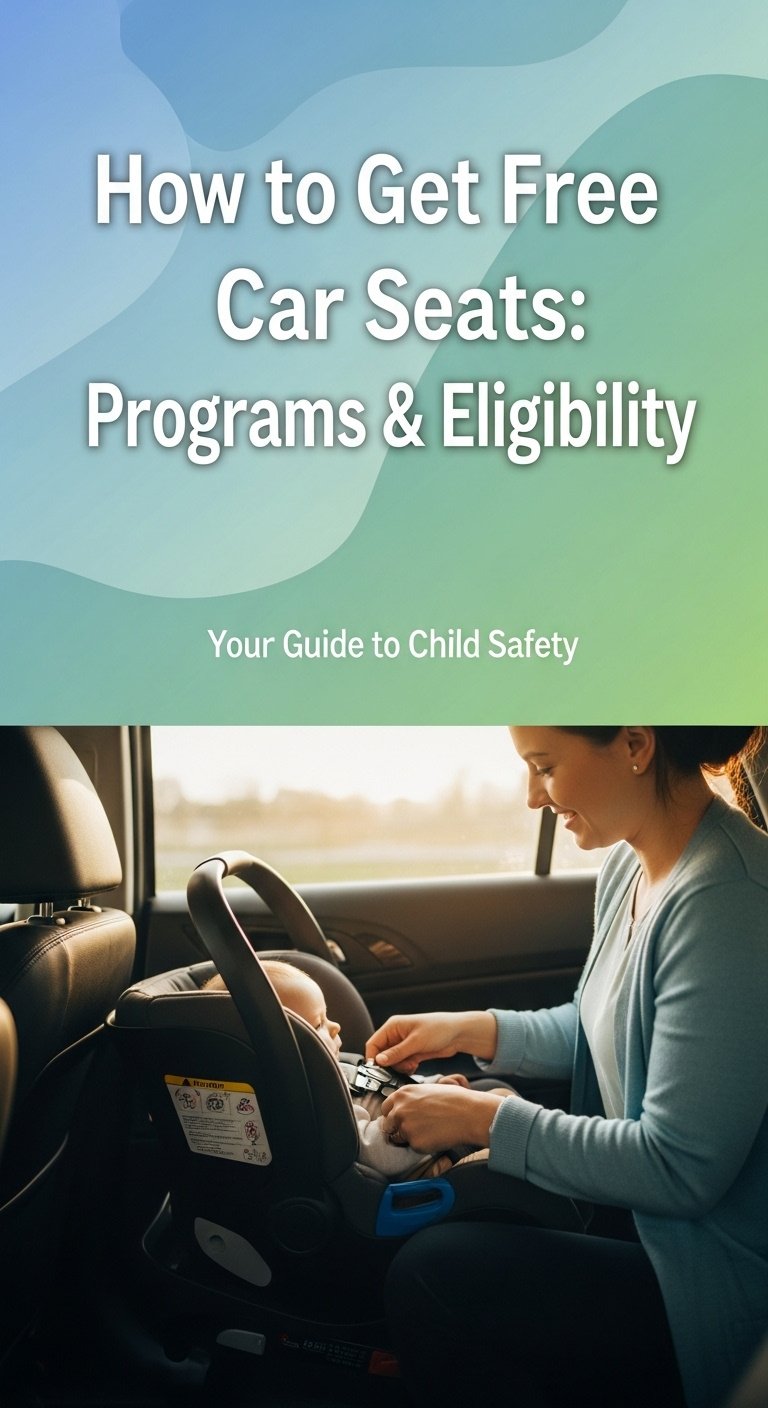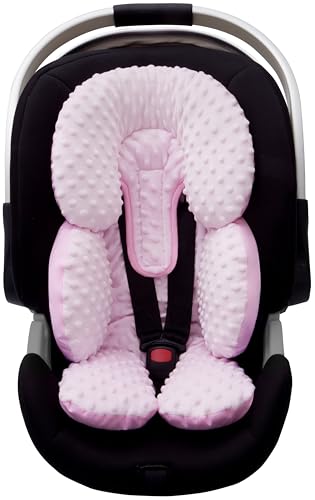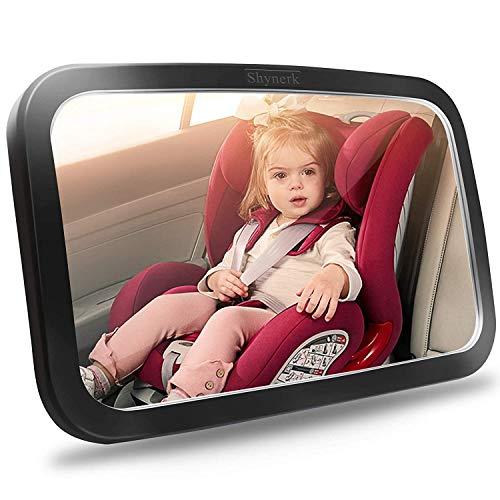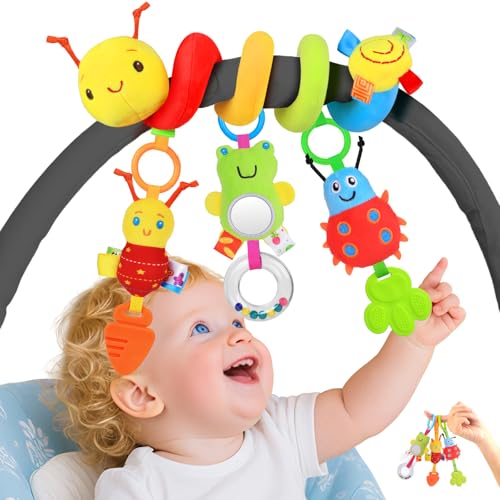Are you an expectant parent or family in need, wondering where to turn for a safe car seat? Navigating the cost of essential baby gear can be overwhelming, but ensuring your child’s safety on the road is non-negotiable. This guide is your definitive resource, created from a comprehensive analysis of public and private programs, to show you exactly where and how you can get a free car seat.
Free car seats are available through government, non-profit, healthcare, and insurance programs, often requiring eligibility based on income or enrollment in assistance plans, and frequently include participation in a safety education course.
This guide will break down the exact types of organizations that offer these critical resources, clarify the common eligibility requirements you’ll need to meet, and provide actionable steps to help you secure a safe car seat for your child. We’ll explore everything from state health departments and federal programs like WIC to national charities and even benefits you might have through your hospital or insurance provider.

Understanding Eligibility: Do You Qualify for a Free Car Seat?
Before you start reaching out to organizations, it’s crucial to understand the common requirements for receiving a free car seat. While specific criteria can differ from one program to another, most follow a similar set of guidelines designed to help families with the greatest need. Knowing these in advance can save you time and help you gather the necessary information.
Eligibility for free car seats typically involves income requirements, participation in safety classes, and enrollment in federal assistance programs like WIC or Medicaid. Most programs also specify that the car seat must be for the legal guardian’s vehicle and that expectant parents should be in their third trimester to qualify. Always confirm the specific eligibility details with the program you’re applying to, as funding and rules can vary by location.
Here are the most common eligibility criteria you are likely to encounter:
- Income Requirements: Many programs are designed for low-income families and may require you to meet federal poverty guidelines.
- Enrollment in Federal Programs: If you are a recipient of benefits like WIC (Women, Infants, and Children), Medicaid, SNAP (Food Stamps), or TANF, you often automatically qualify for car seat assistance programs.
- Participation in Safety Education: A common requirement is attending a short safety course. These sessions are incredibly valuable, teaching you how to correctly install and use the car seat to ensure maximum safety.
- Pregnancy Stage: For expectant parents, many organizations require you to be in your third trimester before providing a car seat.
- Vehicle Ownership: The program will likely require that the car seat be installed in a vehicle belonging to the child’s parent or legal guardian.
Pro Tip: “Always confirm specific eligibility with the program directly, as details can vary by location and funding.”
Government & Public Health Programs Offering Free Car Seats
Government agencies at the state and local levels are often the most reliable source for families seeking assistance. These publicly funded programs are designed to promote child passenger safety and make essential gear accessible to everyone, regardless of their financial situation. From your state’s health department to local emergency services, these avenues are excellent starting points in your search.
Government programs, including state health departments and federal aid like WIC/Medicaid, are primary sources for free car seats, often linked to safety education. The National Highway Traffic Safety Administration (NHTSA) also plays a key role by maintaining a directory of car seat inspection stations, many of which are involved in distribution efforts.
Here are the primary government and public health channels where you can get free car seats:
- State and Local Health Departments: These are often your first and best resource. They manage programs specifically for residents in need.
- Federal Assistance Programs: Benefits you may already receive, such as WIC and Medicaid, frequently have pathways to obtaining a free car seat.
- Local Emergency Services: Police departments, fire stations, and sheriff’s departments are not just for emergencies; many are certified car seat inspection stations and distribution points.
Quick Fact: “Did you know the NHTSA maintains a directory of car seat inspection stations, many of which also distribute seats?”
State & Local Health Departments: Your First Stop
Your journey for a free car seat should almost always begin with your state or local health department. These agencies are on the front lines of public health and safety and often have dedicated programs to distribute child safety seats to income-eligible families. These programs are tailored to the needs of the local community and are an invaluable resource.
State and local health departments frequently provide free car seats, especially for low-income families, often requiring a safety course. By contacting them, you can get accurate information on local availability, eligibility rules, and the steps you need to take. Many of these departments partner with other community organizations to streamline the process for families.
Based on analysis of available programs, here are examples of states with active initiatives through their health departments:
- Texas: The Department of State Health Services (DSHS) runs the Safe Riders program, which provides car seats to families in need after they attend a safety class.
- California: The California Department of Public Health works with local partners to offer car seat education and distribution programs throughout the state.
- New York: The New York State Department of Health supports local initiatives that provide car seats to eligible families.
- Alabama: The Alabama Department of Public Health offers car seat assistance to parents who receive benefits like WIC, Medicaid, or Food Stamps.
- Virginia: The Virginia Department of Health has a Low Income Safety Seat Distribution and Education Program for income-eligible families.
“Check your local health department’s website – many offer online resources for car seat assistance.”
Federal Assistance & Healthcare Plan Benefits
If you are already enrolled in a federal assistance program or have a state-managed health plan, you may have a direct path to getting a free car seat. These programs recognize that child safety is a critical component of overall health and well-being, and many have integrated car seat distribution into their services for members.
WIC, Medicaid, SNAP, and TANF recipients, along with members of certain health plans like Parkland, often qualify for free car seats. This is one of the most common ways families become eligible for assistance. If you are part of one of these programs, your caseworker or a program representative is the best person to ask about available benefits.
Here are some of the key programs and plans that can provide a free car seat:
- WIC (Women, Infants, and Children): This is one of the most frequently cited qualifiers. Local WIC offices often distribute car seats directly or can refer you to a partner agency that does. The North Dakota Department of Health, for example, offers car seats to families qualifying for WIC.
- Medicaid: As a Medicaid recipient, you may be eligible for a free car seat through your state’s health program.
- SNAP and TANF: Similar to WIC and Medicaid, being a recipient of SNAP (Supplemental Nutrition Assistance Program) or TANF (Temporary Assistance for Needy Families) is often a key eligibility criterion.
- Specific Health Plans: Some community health plans offer a free car seat as a benefit to their members. For example, Parkland Community Health Plan in Texas provides a free car seat to members after they complete their first prenatal visit.
“If you’re already enrolled in WIC or Medicaid, you might be closer to a free car seat than you think!”
Police, Fire Departments & Car Seat Inspection Stations
Local police and fire departments are pillars of community safety, and their role often extends to child passenger safety. Many of these locations serve as official Car Seat Inspection Stations, where certified technicians can help you with proper installation. In addition to these checks, many of these stations also distribute car seats to families in need.
Local police and fire departments, along with NHTSA-listed inspection stations, often provide free car seats and crucial installation checks. This is a fantastic two-for-one resource: not only can you potentially receive a seat, but you can also leave with the peace of mind that it’s installed correctly. Some police departments even offer programs to exchange old, expired car seats for new ones.
The National Highway Traffic Safety Administration (NHTSA) is your go-to source for finding a certified inspection station near you. They maintain a comprehensive online directory that you can search by location to find firehouses, sheriff’s departments, hospitals, and other sites staffed by trained technicians.
Keep these points in mind when looking to these resources:
- Call Ahead: Availability of both car seats and technicians can vary. Always call your local fire or police department’s non-emergency line first to inquire about their program.
- Expired Seat Exchanges: Ask if they have an exchange program. Many departments, including the California Highway Patrol, will take an expired or unsafe seat and provide a new one for free.
- Installation is Key: Even if you already have a seat, taking it to an inspection station is one of the most important things you can do. A correctly installed car seat is a safe car seat.
“Did you know many police departments offer free exchanges for expired car seats?”
Non-Profit & Community Organizations: Supporting Families in Need
Beyond government programs, a vast network of non-profit and community organizations works tirelessly to support new and expectant parents. These groups are often funded by donations and grants with the specific mission of providing essential items, including car seats, to families facing financial hardship. They are an essential part of the safety net for communities across the country.
Non-profit organizations like Safe Kids Worldwide, United Way (via 211), Baby2Baby, and local Pregnancy Life Centers are vital resources for free car seats. These organizations not only distribute seats but also frequently host car seat check events where parents can receive hands-on installation help from certified technicians.
Here are some of the leading non-profits and community groups to look for:
- Safe Kids Worldwide: This is a major national organization with local coalitions in hundreds of communities. They are a primary source for car seat check events and often distribute free or low-cost seats to attendees.
- United Way (211 Service): By dialing 211 from any phone, you can connect with a local expert who can direct you to social services in your area, including agencies that provide free car seats.
- Baby2Baby: This organization provides children living in poverty with diapers, clothing, and all the basic necessities, including car seats, through its extensive network of partner agencies.
- Baby’s Bounty: With locations in places like Las Vegas, Nevada, and Montgomery, Alabama, Baby’s Bounty provides essential gear to families in need.
- Pregnancy Life Centers: Local centers, such as the Community Pregnancy Center in Anchorage, Alaska, or Carolyn’s Place in Connecticut, offer support and resources, often providing car seats to parents who complete parenting or childbirth classes.
“Consider reaching out to local churches – they often have community outreach or can connect you to helpful charities!”
Navigating Local Charities & Support Centers
While national non-profits have a broad reach, the power of local, community-based support cannot be overstated. Local charities, churches, and pregnancy support centers are deeply connected to the communities they serve and can often provide not just a car seat but a network of support for new parents. These organizations excel at offering personalized assistance.
Local charities, including pregnancy life centers and churches, often provide free car seats in conjunction with educational or support services. This integrated approach ensures that parents feel confident and prepared. For example, many pregnancy centers require attendance in parenting or childbirth classes to receive items like a car seat, which equips parents with valuable skills and knowledge.
Here are some tips for finding and connecting with these local resources:
- Search for “Pregnancy Resource Center” or “Pregnancy Care Center” in your city to find organizations dedicated to supporting expectant parents.
- Contact Local Churches or Faith-Based Groups, as many have outreach programs or benevolent funds designed to assist community members in need.
- Look for Community Action Agencies, which are local private and public non-profit organizations that work to alleviate poverty and can connect you with the right resources.
- Use the 211 Service, backed by United Way, to get a curated list of local charities that may be able to help with your specific need for a car seat.
“Many of these centers offer more than just a car seat – they provide invaluable support for new parents!”
Healthcare Providers & Insurance Companies: Unexpected Resources
When searching for a free car seat, many parents overlook two major players in their healthcare journey: their hospital and their insurance company. These institutions have a vested interest in the health and safety of their newest patients and members, and many have programs in place to provide this essential piece of safety equipment.
Hospitals often provide free or discounted car seats to patients, especially new mothers, and some insurance companies include car seats as a policy benefit. You cannot leave the hospital with a newborn without a car seat, so many hospitals have streamlined the process by offering them directly to families who may not have one.
Here is how you can explore these options:
- Hospitals & Healthcare Systems:
- Ask During Prenatal Visits: Talk to your OB-GYN, a hospital social worker, or the labor and delivery department well before your due date.
- Patient Programs: Many hospitals have dedicated programs. For example, Children’s of Alabama has a free car seat program for patients at discharge. Phoenix Children’s Hospital and Wolfson Children’s Hospital in Florida also have distribution programs.
- Pay-What-You-Can Models: Some hospitals, like Seattle Children’s, may ask families to contribute what they can toward the wholesale cost of the seat, making it affordable for everyone.
- Insurance Companies:
- Check Your Policy: Review your member benefits or call an agent directly to ask if a car seat is a covered item for new or expectant mothers.
- Specific Provider Benefits: Some insurance plans are known to offer this benefit. For instance, Amerihealth New Hampshire and WellSense both provide car seats to their eligible members.
“Don’t overlook your health insurance policy – a quick call could reveal unexpected benefits!”

Essential Safety Advice: Avoiding Used Car Seats & Ensuring Proper Use
Receiving a new, free car seat is a fantastic start, but your responsibility for your child’s safety doesn’t end there. Proper use, installation, and awareness of safety standards are just as critical. One of the most important rules is to be extremely cautious about used car seats. While it might seem like a good way to save money, it can carry hidden risks.
Avoid used car seats unless their full history is known, as they have expiration dates and can be compromised if involved in a crash; always prioritize professional installation checks. A car seat is a single-use safety device. If it has been in a moderate to severe crash, its structural integrity may be compromised, even if there is no visible damage.
CRITICAL SAFETY WARNING: Never use a car seat if you do not know its full history. Do not accept a used car seat from a stranger or buy one from a thrift store. It is impossible to know if it has been in an accident, is expired, or has been recalled. Your child’s safety is worth the effort of obtaining a new seat from a reputable program.
Follow these key safety tips to protect your child:
- Check the Expiration Date: Every car seat has an expiration date stamped on it, typically 6-10 years from the date of manufacture. Plastic degrades over time, making an expired seat unsafe.
- Know the History: A car seat that has been in a crash must be replaced. Internal, unseen damage can prevent it from protecting your child in a future accident.
- Register Your Car Seat: As soon as you get your new car seat, fill out and mail the registration card or register it online. This ensures the manufacturer can contact you in the event of a safety recall.
- Get it Professionally Checked: Take your car seat to a certified Child Passenger Safety Technician (CPST) at a local inspection station to ensure it is installed correctly in your vehicle.
Pro Tip: “Always register your new car seat with the manufacturer to receive recall notifications!”
To make your car seat even safer and more convenient, consider investing in a few key accessories.
FAQs About where can you get free car seats
Do hospitals give out free car seats?
Yes, some hospitals and healthcare systems provide free or discounted car seats, particularly for new parents or patients being discharged. It is best to contact the hospital’s social work or labor and delivery department directly to ask about any available programs, as not all facilities offer this service.
What documents do I need to get a free car seat?
Documentation requirements vary by program, but you will commonly need to provide proof of income or enrollment in a federal assistance program like WIC, Medicaid, or SNAP. You may also need to show proof of residency and identification. Always check with the specific organization for their list of required documents.
Can I get a car seat through my health insurance?
It is possible. Some insurance companies offer a free car seat as a benefit for insured new or expectant mothers. Plans like Amerihealth New Hampshire and WellSense are known to provide this perk. You should review your policy documents or call your insurance agent to confirm if this benefit is available to you.
Do fire stations give out free car seats?
Sometimes. Many fire stations are certified car seat inspection stations and may also distribute free car seats as part of their community safety programs. However, availability can be limited. It is best to call your local fire department’s non-emergency line to inquire about their programs.
What is the Arkansas law on car seats?
According to Arkansas state law, all children under the age of 16 must be properly secured. Specifically, children under six years old and weighing less than 60 pounds are required to ride in an appropriate car seat. Children between 6 and 15 years old who weigh 60 pounds or more must wear a seat belt.
How can I find free car seat events near me?
To find local car seat events, check the website for your local Safe Kids Worldwide coalition, as they frequently host check-up events where seats are sometimes distributed. You can also contact your state or local health department or dial 211, the United Way’s resource hotline, for information on events in your area.
Is it safe to use a second-hand or used car seat?
It is strongly advised to avoid used car seats unless you know their complete history. Car seats have expiration dates and are designed to be used in only one crash. An older seat or one that has been in an accident may be structurally compromised and unsafe. Always prioritize getting a new seat from a trusted program.
Do federal programs like WIC or Medicaid always include free car seats?
While being enrolled in WIC or Medicaid doesn’t automatically mean you will be handed a car seat, it is one of the most common qualifying criteria for state and local car seat distribution programs. Your enrollment makes you eligible for these external programs, so you should inform the distributing agency that you are a recipient.
Final Summary: Securing Your Free Car Seat for December 2025
Securing a safe car seat for your child is one of the most important things you can do as a parent, and financial constraints should never be a barrier. As this guide has shown, there is a robust network of government, non-profit, and healthcare organizations dedicated to helping you get a free car seat. By knowing where to look and understanding the common eligibility requirements, you can confidently find the resources you need.
Remember to start with your local and state health departments, inquire about benefits through programs like WIC and Medicaid, and explore the generous support offered by community organizations and charities. Your diligence will be rewarded with the peace of mind that comes from knowing your child is protected on every journey.
- Start with Public Health: Your state and local health departments are often the best first stop for finding free car seat programs.
- Leverage Existing Benefits: If you’re enrolled in WIC, Medicaid, SNAP, or TANF, you are very likely eligible for assistance.
- Explore Non-Profits: Organizations like Safe Kids Worldwide and the 211 service are dedicated to connecting families with the resources they need.
- Ask Your Healthcare Providers: Don’t forget to inquire at your hospital and with your health insurance company about potential car seat benefits.
- Prioritize Safety Above All: Always opt for a new car seat from a reputable program and avoid used seats with an unknown history. Get the installation checked by a professional.
Take these insights derived from comprehensive program analysis and confidently apply them to secure a safe car seat for your child today
Last update on 2025-12-28 / Affiliate links / Images from Amazon Product Advertising API











